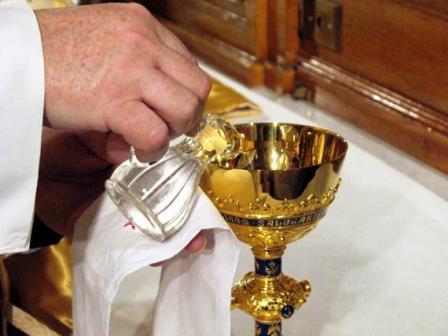Concerning the collection for the saints, as I have ordered the churches of Galatia, so you should do likewise. On the first day of the week let each one of you put aside whatever he or she has gained, so that the collection doesn’t take place when I come. (1 Cor. 16:1-2)
Among the early Christians, there was no modern plumbing in the churches. No one could turn on a faucet to fill a cruet with water. If water was needed—and it was needed to mix with the wine in the chalice—then someone had to bring it to church from a well or a fountain. And among the early Christians, everyone was expected to bring something to offer at the Eucharist: most people probably would not bring cash but they could bring food or clothing to share with the poor. They brought the bread and wine to be placed on the altar. In Rome, orphans–who had nothing and were themselves the recipients of charity–brought the clean water to mix with the chalice for Holy Communion.
Taking a collection of some sort was standard practice at the Eucharist. Offerings (prosphora, in Greek) were a sign that the people making the offering had given themselves and their whole lives to God. The prosphora—food, clothes, money—collected for the saints was an important expression of fellowship, whether the people (“the saints”) receiving the prosphora were local or far away. Making an offering—bringing prosphora—to the Eucharist was an expression of fellowship with the needy saints on earth as well as with the glorious saints in heaven.
St. Paul is organizing a relief effort for the Christians in Jerusalem because there was a famine and severe need there. He is asking all the churches he has founded or visited to contribute to this collection. He will make sure the money gets delivered to Jerusalem, but he wants the local parishes to collect the money before he arrives so that he doesn’t have to wait for the collection itself to be made; he just wants to pick up the money they have already collected and send it on. He was afraid it would take too long if the local parishes waited to take up the collection and that it would arrive in Jerusalem too late.
St. Paul is organizing this relief effort for the Christian community in Jerusalem to demonstrate that he has no animosity or ill will for Christians who were not Gentiles. He is working to relieve the hunger and needs of the Jewish Christians who might have suspected that he thought Gentile Christians were better in God’s eyes than the Jewish Christians were. St. Paul wants to demonstrate that he does not think more highly of Gentile Christians and that all Christians are united in Christ.
St. Paul instructs the Christians in Corinth to organize the collection on Sundays, “the first day of every week,” at the celebration of the Eucharist. Many churches still call the bread brought to church for the Eucharist prosphora. The life of devotion to Christ and public service to the poor go hand-in-hand at the Eucharist. Fellowship with Christ cannot be divorced from fellowship with those in need.


